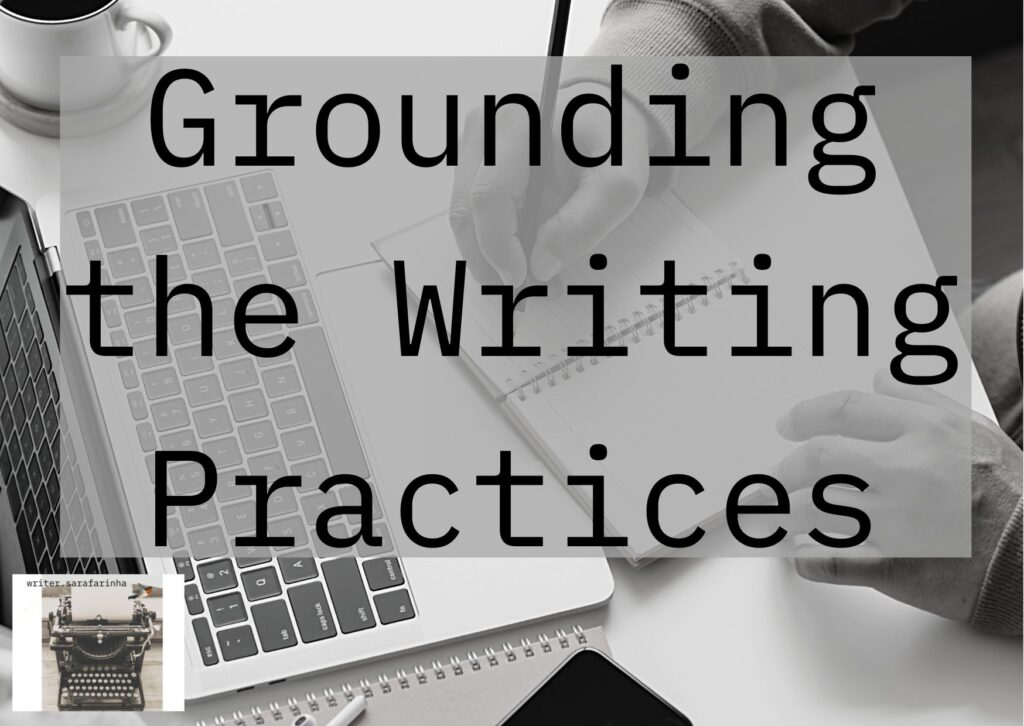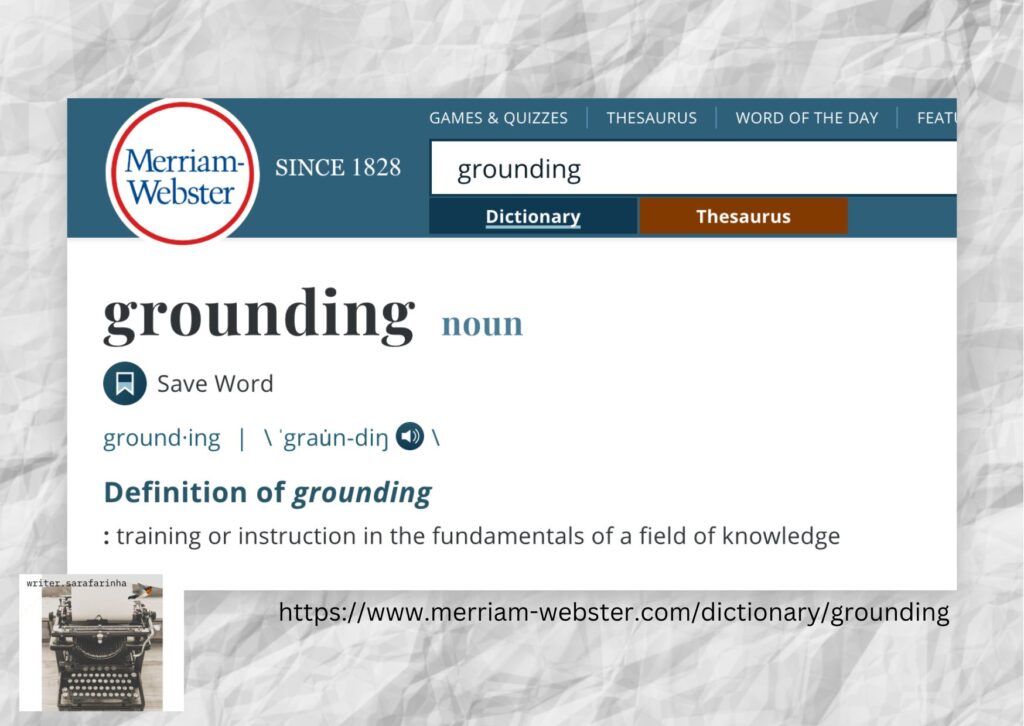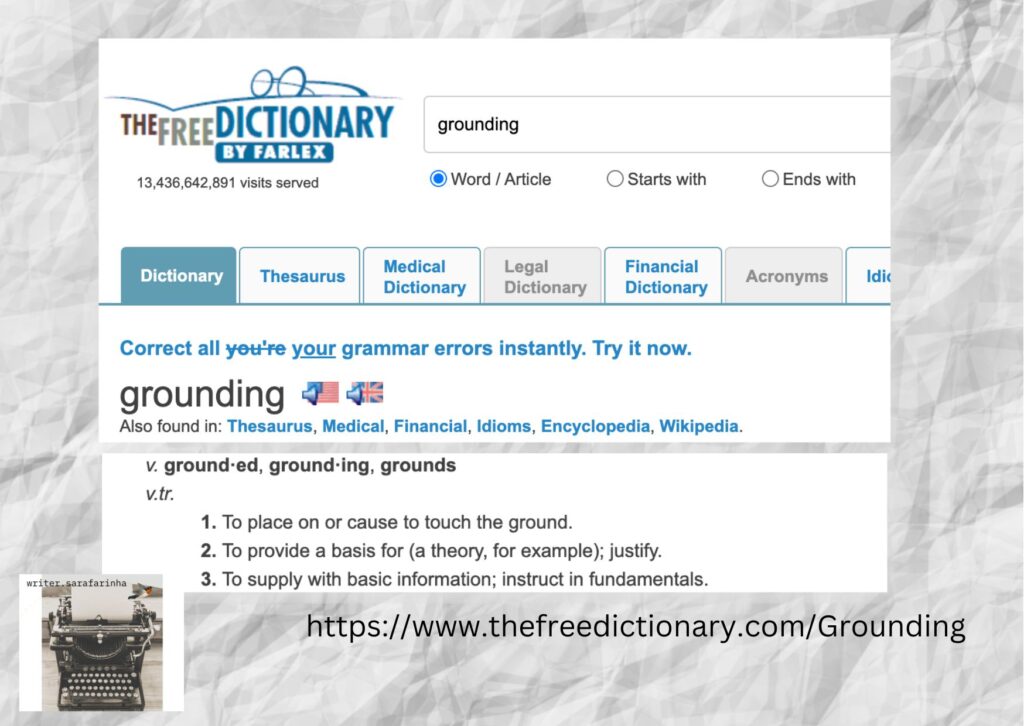
Today we are talking about grounding our writing practices.
Having trouble to face that blank page? To begin something? To just put your tutu on the chair?
Yeah! I know where you’re at. Been there too many times to be willing to face them all.
A few years ago, my first big discovery to help me cope with this matter was a book (not a big surprise here! I tend to go looking for answers in books).
It was “The Artist’s Way” by Julian Cameron, and it helped me face some things about my life and my choices, which stayed with me until today.
Other books helped me as well, but let’s not get on to all of those. It’s quite an extensive list.
Throwing in this mix, is a decade and a half of fiction and non-fiction writing, and I realised I have been teaching myself how to properly ground my writing practices.
Meaning of grounding

Grounding as in training or instruction in the fundamentals of a field of knowledge. But it isn’t fully that.

Grounding as connecting something to its ground. To provide a basis, to justify, to instruct in fundamentals.
Grounding my writing practices in solid foundations to which I can return to every day.
What am I talking about?
When I start a new project, any project, like cooking a recipe, writing a paper, cleaning my house, take on a 9 to 6 job… the first thing I worry about is to learn about the task at hand.
Organising inside my head what it needs to be executed. Which are the rules applied, what tasks needs to be done, how to do it the best way I can. Reaching into past lessons and composing a how-to-do-this the best way I know how.
When I’m feeling less okay about it, or not enjoying the task at hand, I tend to avoid it by diverting my attention to other things… even if they are writing related tasks.
And by doing that, I loose my ground on the task that got me overwhelmed in the first place.
I had to learn how to ground myself on those works, that I wanted to be doing, even if they feel overwhelming.
Warming up to it
Trying to start something without proper warm up can cause injuries. I remember this from gym classes and it applies throughout.
To start writing without a proper warm up is just an injurie waiting to happen.
Inducing a mind space welcoming to the activity, is essential to avoid the black page block.
To ground myself onto my writing practices isn’t easy or learn-to-never-forget type of atitude. No, it’s hard and constant work.
So, in each day, I’ve come up with a few practices that help me ease myself into writing for the different projects I’m working on at the moment.
I first do something which usually gets me thinking and taking notes on something else. I set a scenery, a time, a place, in which I know that as soon as I enter it, I’ll sit and perform.
What I use to warm up
I choose to ground myself into my writing practice by using other means of input and output.
These include journalling, goal cards, collage, vídeos, music, meditation, even reading emails is good warm-up and a thoughts collector.
These practices help me ease myself into a mental state in which Flow can take over.
For example, “today” I started to write on my Mind Tools Journal and ended up with my notebook open, writing some short-story fiction, which occurred to me while trying to find a rhyme and reason on my yesterday’s tasks. From there, I went to this very blog post you are reading, and a short essay on a non-related theme… because I started to listen to some video-talk and it got me these ideias…
Producing isn’t Consuming
Please do not mistake these strategies with consuming stuff online. It is purposefully used to help me sit on this (or any other) chair, and proceed with my writing schedule.
And it’s not every day that I am working on building new stories. Sometimes, I’m editing, or revising, or marketing, or making other types of content.
Also, I have now a broader sense of what is included in my writing time.
Sitting myself to write fiction, also includes writing a story plan, some notes, scene cards, and whatever material I need to come up with a story.
It was not a very long time ago that I didn’t include my preparation work as writing time. I just saw the hours, in which I wasn’t scribbling away, inside the text document, that held the current work in progress. By those standards, I never did enough writing. (Not that I think I do enough. I don’t. I could always be writing more and I am working on that)
Copywriting is still writing. Poetry is still writing. Blog posts… daily journalling, ideas for books and videos, scripts for VLook…
I draw the line on writing shopping lists and excel files. Those I don’t consider writing, even if they are essential to the writer’s life.
How to make it work?
Grounding my writing practices, interconnecting them with my life’s daily tasks, feels like any other new habit we integrate.
For example, when we meditate we go to our mental space of calmness (some times more than others). We focus on the practice, ground ourselves to it, and let the breathing and the directed attention do their thing, to help us let go of all that stuff that’s weighting down on our minds.
Grounding on my writing practices started to feel the same way. Letting go of all the noise which emanates from our daily life’s and just focus on allowing myself to create something, to bring something forth.
It feels like entering a space, being transformed enough by being there, calm enough to play, focused enough to mentally open and let ideas flow.
Does it always work?
As much as any other focused practice.
Introducing a few grounding practices at a time, experimenting with what helps get our minds engaged and producing ideas. Allow these practices to form a true constancy in our daily life. Tying them to our writing practice.
There are a lot of exercises, like gratitude practices, keeping a schedule, or collaging next months goals in front of our desk, which can serve us in several ways.
And there are different practices. There are people which tied their writing practice to going somewhere, for example. Going to a coffee shop to write. To seclude themselves in an hotel room (like some well known writers), or go to a writing retreat… even to writing live on Twitch.
All these are grounding writing practices. They anchor the writing activity to some other event so, each time we are doing it, we have all the cues to start writing and no other solution than to write our time out of there.
It took me a few years to learn how to do this and a few more to understand why and how they worked for me.